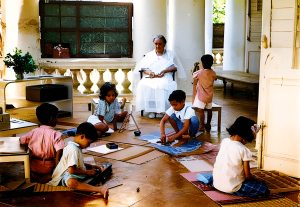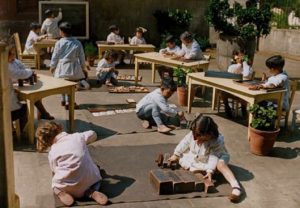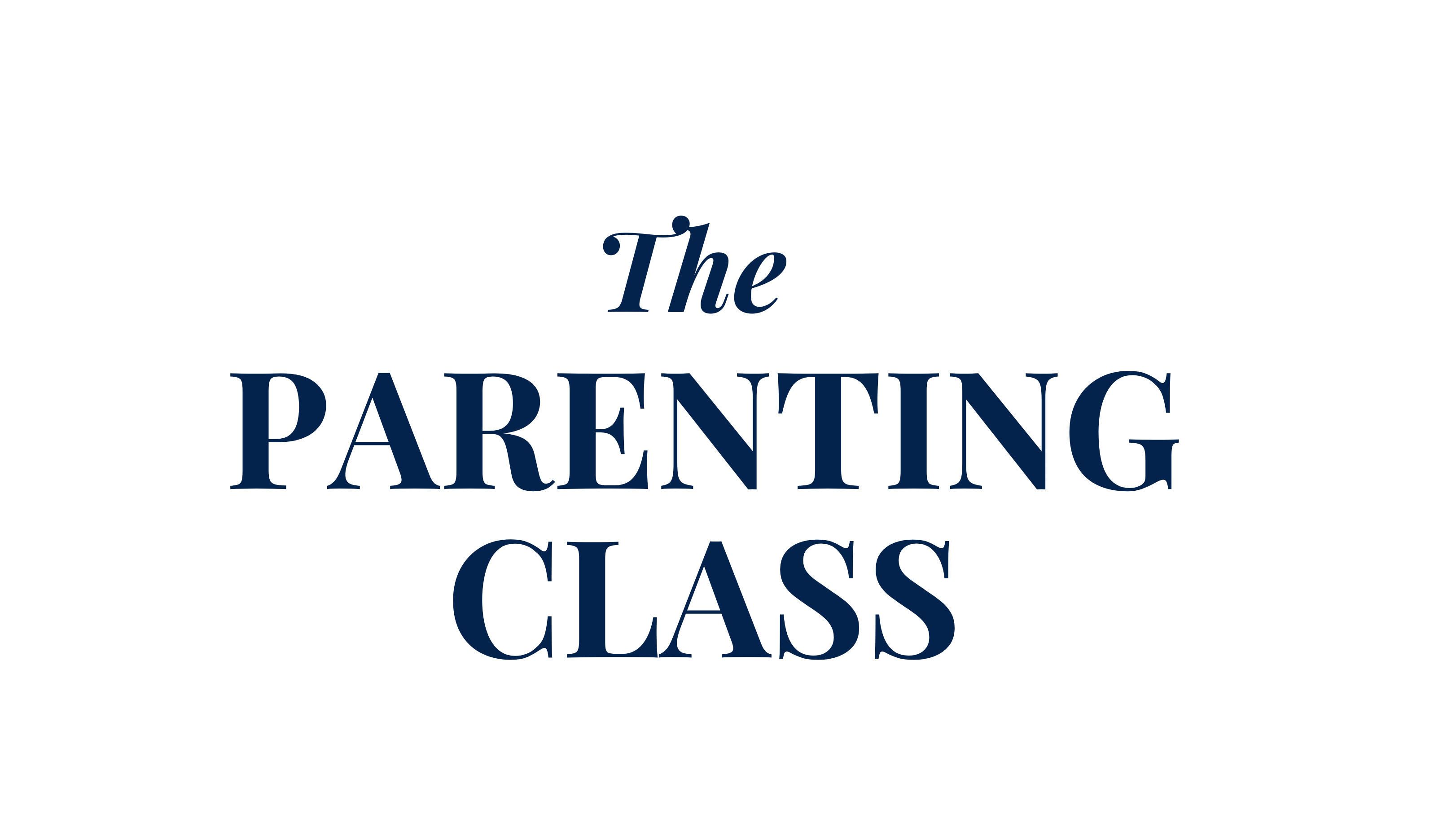Montessori, Authoritative Parenting, and the Fight Against Oppression

Maria Montessori’s groundbreaking educational philosophy championed independence, curiosity, and critical thinking—values that stood in stark opposition to authoritarian regimes like fascist Italy and Nazi Germany.
Yet, her work was not just a rejection of oppressive systems; it also aligned with the principles of authoritative parenting, a balanced approach that fosters both discipline and autonomy in children.
Developmental psychologist Diana Baumrind saw Montessori’s emphasis on structured independence as a reflection of her own findings on socialization, particularly in the authoritative parenting style.
Baumrind acknowledged the influence of educational theorists like Montessori and group dynamics theorists like Kurt Lewin in shaping her understanding of socialization[1].
Montessori’s Educational Philosophy and Its Alignment with Authoritative Parenting
I talk about 60 years of research on authoritative parenting, its short-and long- term outcomes and how it compares to gentle parenting, permissive parenting and other styles in my class The Science of Parenting Babies alongside 9 other modules for your child´s first 2 years.
Central to Montessori education is the belief that children thrive in an environment that nurtures self-direction while providing structure.
Classrooms are designed to encourage exploration, responsibility, and collaboration, allowing students to take ownership of their learning. This philosophy closely mirrors authoritative parenting, which balances warmth and responsiveness with firm expectations.
Like Montessori educators, authoritative parents set clear rules but allow children to make choices, fostering self-discipline and intrinsic motivation[2]. Nancy Rambusch (1962), a Montessori advocate, described how authoritative control in Montessori classrooms resolves the tension between personal freedom and the need for order. Discipline, she argued, is not imposed solely by the teacher but emerges from three sources[3]:
- The environment, which is carefully structured to guide children’s behavior.
- The teacher, who maintains an authoritative presence and steps into a more directive role only when necessary.
- The children, who develop internal discipline through their engagement in meaningful, self-directed activities.
This “three-way arrangement” contrasts with models in which either all authority resides in the teacher (authoritarian) or in the children (permissive). Baumrind’s authoritative parenting framework follows the same structure – balancing adult guidance with opportunities for children to develop autonomy[4].
Like Montessori, she rejected both extreme control and excessive permissiveness, believing that true development requires both structure and independence[5].

The Clash with Authoritarian Regimes
The rise of fascism in Italy and Nazism in Germany brought educational systems under strict state control, aiming to mold youth into obedient followers. Montessori’s emphasis on independent thought and critical analysis was perceived as a direct threat to these regimes’ objectives[6].
In Italy, Benito Mussolini initially supported Montessori schools in the 1920s, recognizing their potential to cultivate disciplined citizens. However, as the regime demanded absolute conformity, tensions grew. Montessori refused to compromise her methods to align with fascist ideologies, leading to the closure of her schools and her eventual exile in 1934[7].

Similarly, in Germany, the Nazi regime deemed Montessori education incompatible with its indoctrination goals. In 1933, Montessori schools were systematically shut down, her books were burned, and educators associated with her work were persecuted.
Nazi ideologue Alfred Rosenberg labeled the Montessori approach as “un-German” and infused with “Jewish and Marxist elements”[8]. These actions reflected the regime’s fear of independent thinkers – children raised to question authority and develop their own perspectives.
The Lasting Impact of Montessori and Authoritative Parenting
Despite these attempts to suppress her work, Montessori’s educational philosophy proved remarkably resilient. Exiled from her home country, she continued to spread her ideas globally, ensuring that generations of children would benefit from her approach.
Today, Montessori education thrives in over 15,000 schools across more than 140 countries, a testament to its enduring effectiveness[9].Much like Montessori education, authoritative parenting stands as a counterbalance to rigid, authoritarian structures.
Research consistently shows that children raised with an authoritative approach – where expectations are high, but support is equally strong – grow into responsible, independent, and self-motivated individuals[10]. The Montessori classroom and authoritative parenting both prepare children not to simply follow orders, but to engage with the world critically and confidently.
Baumrind emphasized that both overbearing control and unconditional acceptance are detrimental to children’s development[11].
Like Montessori, she believed that children must experience both autonomy and clear guidance to thrive. She critiqued models that either placed total authority in adults or removed structure entirely, seeing Montessori’s work as a successful balance between the two[12].

Educational Freedom as a Defense Against Conformity
The historical suppression of Montessori education highlights the profound impact that fostering independence and critical thinking can have on society.
In an era where authoritarian regimes sought to suppress individuality and enforce blind obedience, Montessori’s method and Baumrind’s authoritative parenting principles stood as beacons of educational freedom.
By raising children who are encouraged to think for themselves within a structured and supportive environment, both Montessori education and authoritative parenting continue to shape resilient, thoughtful individuals prepared to uphold democratic values and challenge oppression.
Want to know more about authoritative parenting?
Have a look at The Science of Parenting Babies, where I cover the key research behind it alongside 9 other modules crucial for your baby’s first 24 months.
And stay tuned for my upcoming webinar series on Authoritative Parenting by subscribing to my newsletter.
References
- Baumrind, D. (1967). Child care practices anteceding three patterns of preschool behavior. Genetic Psychology Monographs, 75(1), 43-88.
- Montessori, M. (1912). The Montessori Method. Frederick A. Stokes Company.
- Rambusch, N. M. (1962). Learning How to Learn: An American Approach to Montessori. Helicon Press.
- Baumrind, D. (1971). Current patterns of parental authority. Developmental Psychology Monographs, 4(1), 1-103.
- Rambusch, N. M. (1962), pp. 49-50.
- Kramer, R. (1976). Maria Montessori: A Biography. University of Chicago Press.
- Gutek, G. L. (2004). The Montessori Method: The Origins of an Educational Innovation. Rowman & Littlefield.
- Book: The Montessori Movement in Interwar Europe: New Perspectives
- Association Montessori Internationale (AMI). (2021). Montessori education today. Retrieved from montessori-ami.org.
- Baumrind, D. (1991). The influence of parenting style on adolescent competence and substance use. Journal of Early Adolescence, 11(1), 56-95.
- Baumrind, D. (2012). Differentiating between confrontive and coercive kinds of control: Necessary distinctions for understanding authoritative parenting. Human Development, 55(2), 35-51.
- Baumrind, D. (1966). Effects of authoritative parental control on child behavior. Child Development, 37(4), 887-907.

